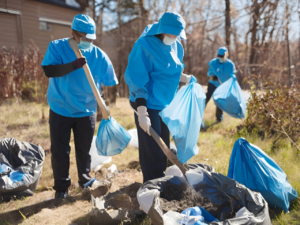With World Environmental Health Day on 26 September, Dr. Mark Williams-Wynn, vice-chair of the KwaZulu-Natal Branch of the Institute of Waste Management of Southern Africa (IWMSA) notes that so-called “pockets of excellence” do exist and they seem to inspire others to follow suit.
South African communities are increasingly becoming aware of how their own actions and projects can add value to their surroundings. This is not only in terms of improving the environment but also in creating safer, cleaner neighbourhoods with better property values.
According to Dr. Mark Williams-Wynn, vice-chair of the KwaZulu-Natal Branch of the Institute of Waste Management of Southern Africa (IWMSA), the recognition of the need for “waste management beyond simply placing one’s rubbish into the municipal bin” has only arisen on a personal level worldwide in the last few years.“South Africa is lagging behind in terms of community-driven waste management,” he says. “This could be because of the expectation that the government will supply the required facilities or services.”
Litterboom and Regenize paves the way
Williams-Wynn says the Litterboom Project (which operates on eight rivers in KZN and two in Cape Town) is a shining example of what can be achieved when a community “buys in” on a project. The primary focus of the project is intercepting plastic pollution in rivers before it enters the ocean. It removes roughly 1.5 tonnes of waste per clean-up. “However, they are also tackling the plastic problem through an upstream eco-system model, which includes improved waste management systems, education, and innovation,” Williams-Wynn adds. “This requires coordination between municipalities, plastic producers, and the private sector.”“Another exciting aspect is their ‘Wastrepreneur’ program, where they are working with entrepreneurs from the communities to beneficiate and create value from the waste plastic collected.”He says another project that deserves recognition is “Regenize”, an initiative to make recycling more accessible and inclusive. “Their REACT program partners with waste reclaimers to support and provide them with equipment, giving them dignity. It also educates the youth in the communities where they work.”
Benefits include Empowerment and sense of Ownership
 The benefits of communities leading their own clean-up initiatives include ensuring that “what is required is implemented”, according to Williams-Wynn. “After all, each community has its own expectations and needs.”
The benefits of communities leading their own clean-up initiatives include ensuring that “what is required is implemented”, according to Williams-Wynn. “After all, each community has its own expectations and needs.”One of the challenges, though, is that many types of waste cost money to manage and process. “Therefore, for poor communities, it is more difficult to implement, and they are the ones that most need these solutions. However, the benefits of community-led clean-up initiatives go beyond just the management of the waste. They result in the empowerment of the community and ownership of the area.”
That being said, community-led initiatives should not be seen as a “free pass” for the government not to do its constitutional duty.“Governments and communities can collaborate on initiatives like these, with municipalities providing the technical support,” Williams-Wynn says. “Communities could be doing the collection and consolidation of the waste. Yet they need the municipalities in terms of processing and sending waste to the correct facilities.”







